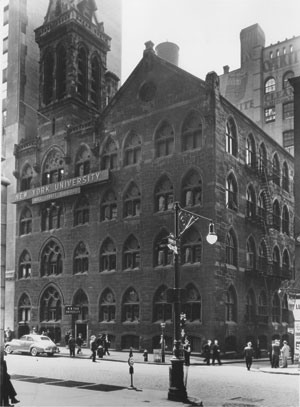
Humble Beginnings, Rich Heritage:
A Tale of Trinity Place
By Marilyn Harris

The original home of NYU Stern (GBA, as it was then known) – from 1921 to 1960 – was the former Trinity Church School building located on Trinity Place near Wall Street. |
The $35 million Concourse Project at NYU Stern is well under way, marking another milestone in NYU Stern’s history. As the physical and learning environments of key areas of the School undergo their transformation, now is a good time to look back at the rather plainer trappings of an earlier era. From 1921 to 1960, the home of NYU’s Graduate School of Business Administration (GBA), as it was called, was the former Trinity Church School building at 90 Trinity Place, close to Wall Street.
On a pure comfort level, those weren’t the good old days. Dean Emeritus Abraham L. Gitlow, in his book New York University’s Stern School of Business: A Centennial Retrospective, reports how former Dean John T. Madden described the premises at Trinity Place in 1937: “A visit to the Wall Street building on any evening from 4:30 to 9:00 pm [classes were evenings only] would reveal the paucity of the facilities for the work accomplished. In fact, it may be said that if the students were not convinced of the value of the instruction which they receive, there would be no other incentive to attend.”
Professor Emeritus Ernest Kurnow, who at 96 still teaches three statistics classes each year, began teaching at Trinity Place in 1950. He recalled recently that faculty offices were in the basement, with three or four professors sharing an office and a desk: one drawer per professor. The ventilation was so poor, in the summer, large fans would be whirring away in the back of each classroom, forcing teachers to virtually shout their lessons. The paper-thin walls gave new meaning to the phrase “interdisciplinary,” and the building shook regularly as the BMT subway trains passed underneath.
Still, the adversities – and the School’s location near Wall Street – had advantages. For faculty, said Kurnow, the close quarters created good morale and engendered fertile discussions and the exchange of ideas leading to meaningful research. Denizens of the basement offices included, among others, such academic giants as Marcus Nadler and Jules Bogen in finance; Peter Drucker, the management guru; W. Edward Deming, whose work in quality control played a large part in the post-war emergence of Japan as a major economic power; and Herman Kroos, an outstanding economic historian.
For its students, according to Gitlow, the School was a vital, productive, and important educational enterprise. Thousands of part-time students, many of whom walked over to Trinity Place after a day’s work on Wall Street, earned their MBAs and went on to become leaders of American business.
By the mid-1950s, however, the School realized that its success meant it was time to move on and provide its citizens with an environment more conducive to teaching and learning, and a fundraising campaign was launched. In 1960, nearby Nichols Hall was christened. The 10-story, fully air-conditioned structure, complete with a two-story library, bookstore, and administrative offices, was a vast improvement. The expansion facilitated the School’s adoption of a full-time MBA program, as well as an enhanced doctoral program.
The move uptown, in 1992, affirmed the School’s status as a full-time undergraduate and graduate institution. Most important, it created a unified campus that both reflected and reinforced a long-sought sense of community that was hindered by separate campuses and, earlier, by the original part-time nature of GBA.
The Concourse Project renovations – made possible by the generous support of donors, alumni, corporate partners, and friends – promise to bring the Stern campus in line with a reputation for leadership and excellence that has far outpaced its physical plant. Kurnow, for one, who’s seen it all over his career, put it this way: “There’s no comparison with the old facilities. Now we’re in heaven.”
Marilyn Harris is editor of Sternbusiness.


![]()